China’s Foreign Minister Qin Gang disappears – and the government does not say a word about it for an entire month. High-ranking meetings are canceled or postponed, predecessor Wang Yi keeps stepping in. Rumors keep spreading. Finally, there are new developments in the Qin case: Xi Jinping has officially removed his former confidant from office. His predecessor Wang Yi takes over. But Qin’s whereabouts remain unclear.
The leadership may now consider the matter settled. But this incident severely tarnishes China’s international reputation, and it also has repercussions within the country. In his analysis, Finn Mayer-Kuckuk investigates why Xi wanted to dismiss the minister so quickly. There must have been serious reasons. Qin had almost certainly crossed a red line.
Domestic journalists are also supposed to work within the given lines. To do this effectively, there is a new app and platform for media professionals. It is designed to help journalists sharpen their “Marxist view of journalism,” as the All-China Journalists Association explains. What is really behind the “Journalist’s Home ‘University Hall’” (“记者之家 “大学堂) is pretty clear: It is about controlling journalists. The educational units are compulsory, and successful participation in the courses is a prerequisite for renewing the press pass, for instance, as Amelie Richter writes.

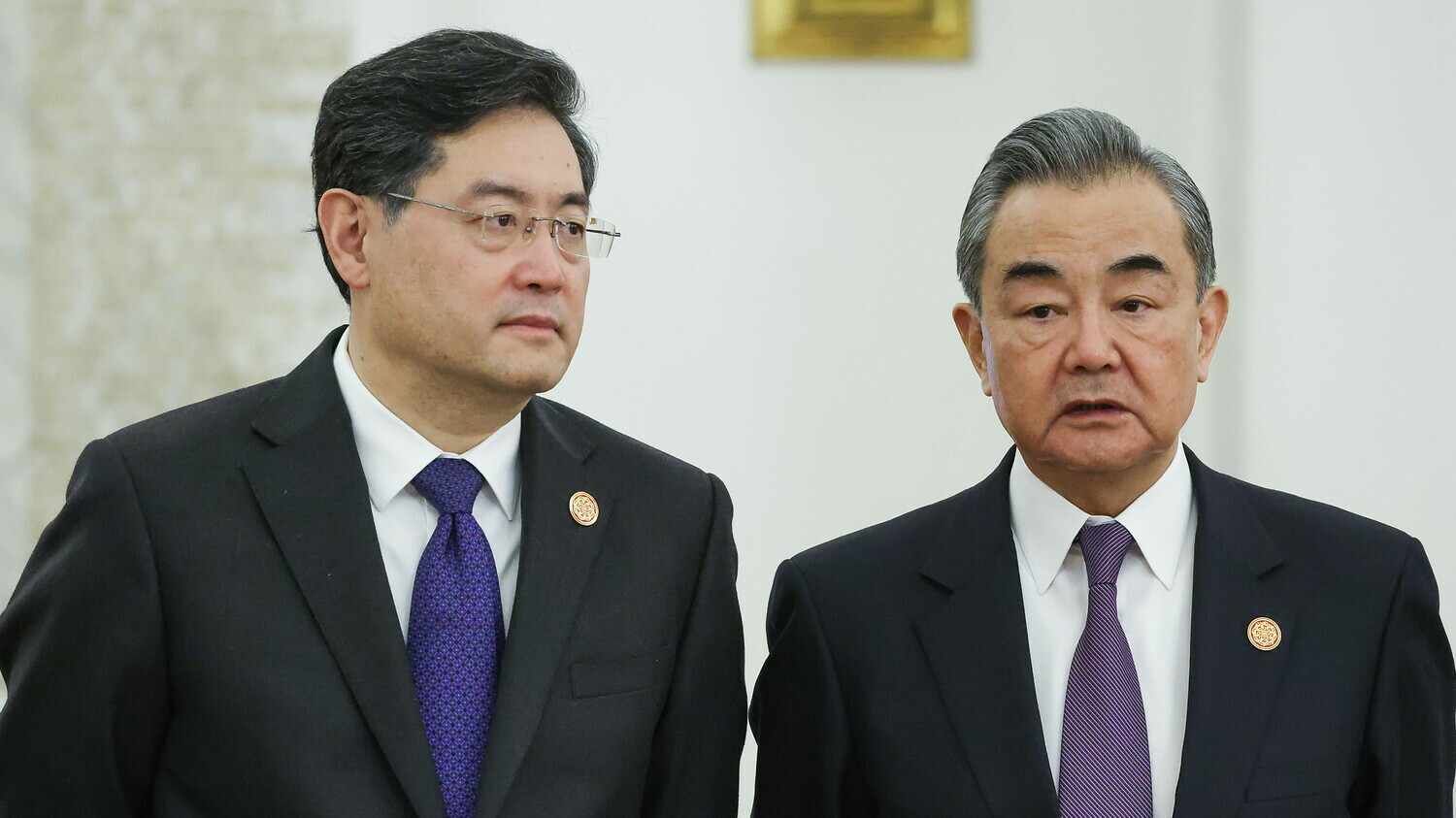
Head of state Xi Jinping has removed incumbent foreign minister Qin Gang from office. The leadership released a short announcement on the website of the state broadcaster CCTV. Former Foreign Minister Wang Yi will take over again. Qin has been absent since 25 June and is apparently in the custody of party organs, possibly the Disciplinary Commission.
The ousting of a foreign minister while the government is in office is also uncommon in China. It was more common in the chaos of the Cultural Revolution when, for example, Marshal Chen Yi was ousted in 1972 after almost 14 years in office. Chen’s successor Ji Pengfei was in office for a similarly short time until 1974, like Qin Gang. Since then, foreign ministers have been able to end their terms in office generally smoothly.
In China, ministers are appointed by the parliament, the National People’s Congress. It thus also required a decision by the Standing Committee of the People’s Congress to remove Qin from office. However, his actual removal then came in the form of a decree by President Xi Jinping.
Xi’s personal signature is also the main clue to the reason for the abrupt change in the foreign office. Apparently, the matter involves Xi directly. It is very probable that the state and party leader is the driving force behind Qin’s removal.
In any case, there had to be extreme processes within the top leadership behind this. It usually prefers to present itself as perfect and untouchable and displays a façade that is as smooth as possible. But in this case, the urgency of the removal seems to have been far more important than saving face. The disappearance of a foreign minister – China’s face to the outside world! – attracts unrelenting attention around the world.
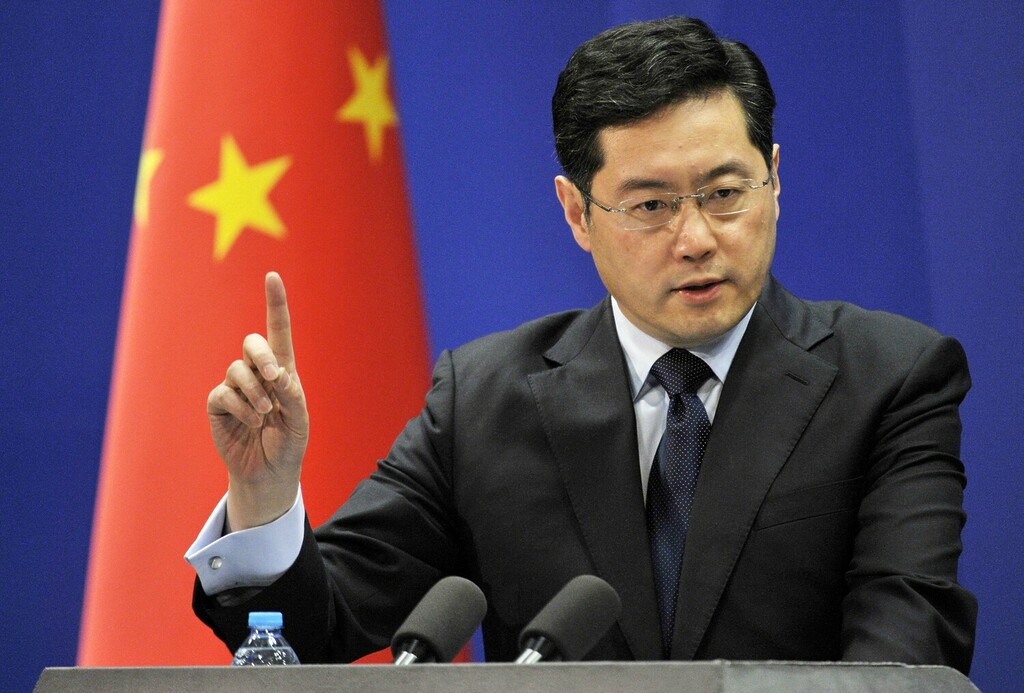
Qin is particularly well-known to international journalists. He was an envoy at the embassy in London. He briefly answered journalists’ questions in briefings as a spokesperson for the Foreign Ministry. And Qin was ambassador to the United States. Hardly anyone enjoyed greater international prominence. He fiercely defended the People’s Republic and its system in all his posts.
The high-profile appointment brings the distinguished foreign policy expert Wang back to state office. Wang Yi now serves in both top diplomatic posts:
Wang is considered a loyal ally of Xi Jinping within the party. He had also recently taken over Qin’s appointments. However, Qin has also repeatedly been said to be very close to Xi.
Germany’s Foreign Minister Annalena Baerbock had already met both officeholders in person.
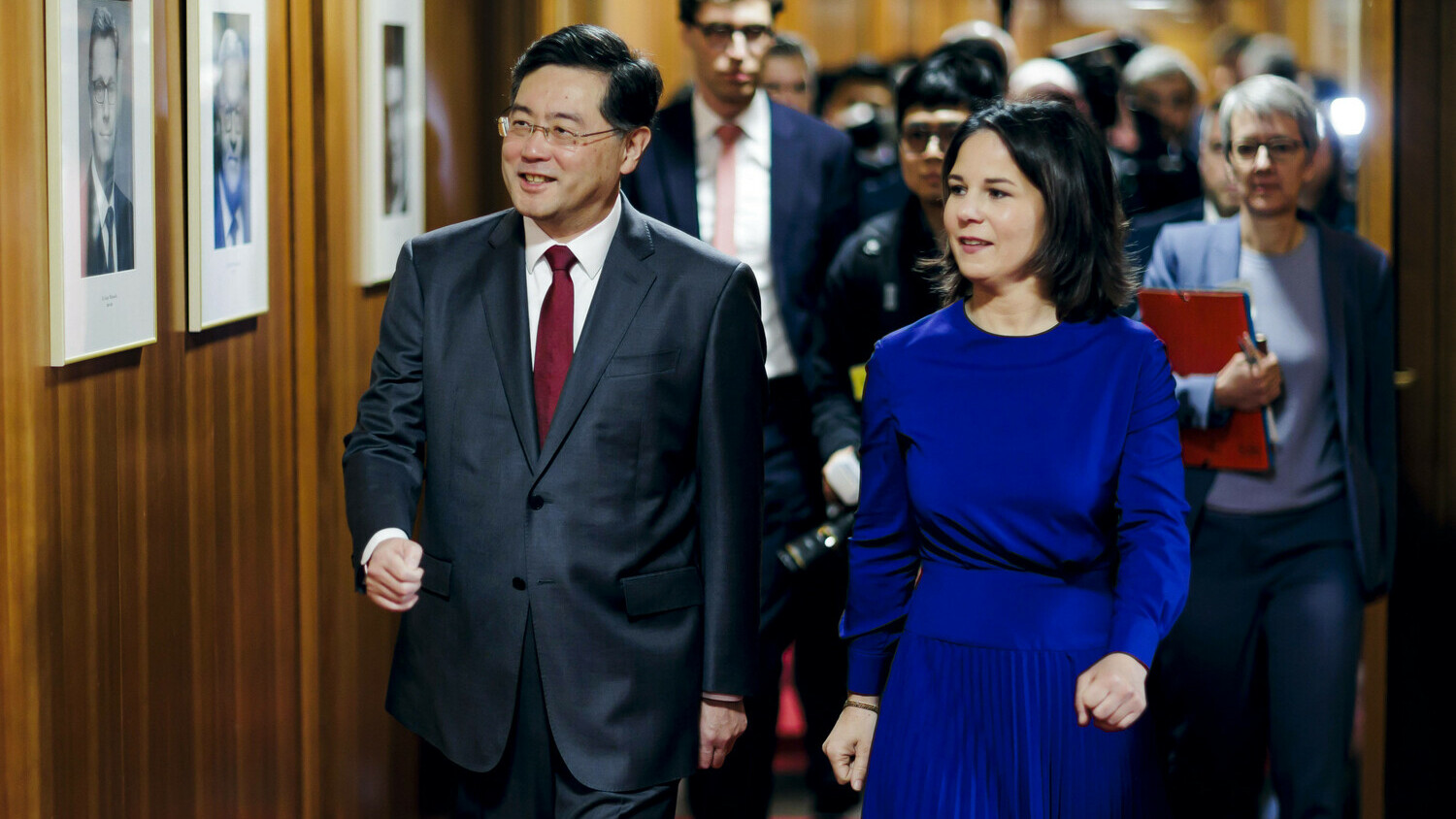
Leadership disputes are the rule rather than the exception in China, too. Many current attempts to find an explanation almost certainly fall short. The Japanese newspaper Nikkei, for example, claims that there had been a rivalry between Wang and Qin. But that is not enough for removal that would trigger such shock waves inside and outside the party. Xi would have to moderate such disagreements between his followers. The system generally has no problem withstanding such disputes.
Rumors among China observers say that Qin has cultivated too close a relationship with an inner-party faction that repeatedly criticized Xi. A more severe version of the rumor, claims it has even plotted overthrowing the ruler. This would at least explain the urgency and the severity with which Qin was removed.
One theory that Qin had a relationship with the journalist Fu Xiaotian from Phoenix TV, which ultimately led to his downfall, has gained much attention lately. Even this is far from enough to explain Qin’s fall. Many of the top cadres, almost all of them male, also have girlfriends or mistresses besides their spouses. CCP bigwigs use their privileges to get away with it without sanctions. Even in the case of sexual assault, the female victim tends to disappear rather than the influential perpetrator.
This is why the theory of Qin’s downfall over an affair also includes a variant in which Qin supposedly passed on military secrets to Fu. Depending on the version, Fu is also a double agent in this. As things stand, this story falls into the realm of bogus social media stories.
In the absence of clear communication from the CCP, such rumors spread unhindered. And they do so both in the country and internationally. The party is not doing itself any favors. It damages its international reputation. The mistress story, for example, makes the leadership appear unprofessional. Baerbock’s respected contact person from April, whom she took very seriously as a representative of China, is already a thing of the past.
But the obscure processes are also detrimental domestically. They only reinforce the impression of a detached leadership rife with intrigue. If the people cannot discern how decisions are made, it undermines the already implausible claim that China is somehow a kind of democracy.
Beijing wants to align Chinese journalists more closely with the party line: With a newly introduced platform and accompanying app, media professionals are to be taught the “Marxist view of journalism.” The All-China Journalists Association (ACJA) presented the app “Journalist’s Home ‘University Hall’” (“记者之家 “大学堂) in late June.
Members of the media are expected to watch training videos and complete online workshops on the online training platform. Course certification including training results can be checked when renewing press passes (记者证). According to Chinese state media, the app includes more than 220 courses on the Marxist view of journalism (马克思主义新闻观).
The concept of the “Marxist View of Journalism” is a shifting set of ideas that cannot be exactly defined, explains the China Media Project (CMP). The research project, which is now based in the United States, emerged from the University of Hong Kong’s Journalism and Media Studies Centre and specializes in media and reporting in mainland China and Hong Kong.
In general, the Marxist View of Journalism is the dominance of the Chinese Communist Party in the news media and the control of information, writes CMP. Journalism in the People’s Republic thus wants to clearly distinguish itself from Western ideas of journalism. This includes the notion that the press sees itself as a fourth power in the state. The concept of Marxist journalism is at the core of media training in China, explains CMP.
The platform “will play a positive role in educating and guiding journalists to concentrate their souls around Xi Jinping Thought on Socialism with Chinese Characteristics for a New Era”, said a press release from the ACJA and Xinhua news agency. Millions of journalists nationwide would now be able to take the training courses.
When the app was introduced at the end of June, ACJA head He Ping said it was crucial to “strengthen the backbone” of journalists in China and “arm” their minds with Xi Jinping’s governing concepts.
The true purpose of the training app and platform is “frighteningly simple”, CMP’s David Bandurski told Table.Media: “For many years, the Chinese party leadership has emphasized the need to control the media and information. A crucial part of this process is licensing journalists and ensuring that they discipline themselves and act in a way that benefits the party state.”
China’s media professionals have to go through an annual evaluation process to obtain a new press pass, Bandurski said. This includes education in the “Marxist view of journalism”. He said the purpose of the app is to simplify this process for the authorities and ensure that the idea can remain ever-present for journalists. “It is simply about control,” says Bandurski.
But the day-to-day work of foreign media professionals in China could also become even more difficult – because a recent amendment to the Counter-espionage Law came into effect in early July. The amendments, passed in April, broaden the definition of espionage and prohibit the disclosure of any information deemed related to national security. This could also prove problematic for foreign correspondents in China.
Press freedom analysts believe the changes will make it more difficult to obtain information. “Quite a few of us are worried about what it is and what it might mean,” US foreign broadcaster VOA quoted a foreign correspondent in Beijing as saying. At present, it is difficult to foresee what the implementation will mean for everyday work, they said. “Any kind of news gathering seems like it could be construed as a violation of this law,” the journalist added.
In the revised law, the definition of espionage also includes access to “documents, data, materials, or objects related to national security and interests.” According to Cedric Alviani, head of the East Asia office of Reporters Without Borders, “basically this means any kind of information.” The law has been kept deliberately vague, he added.
The Chinese embassy in Washington said it referred VOA to a statement by Chinese Foreign Ministry spokeswoman Mao Ning. She stressed that “there is no need to associate the counterespionage law with reporting activities of foreign journalists.” China welcomes journalists from all countries working in the People’s Republic in accordance with laws and regulations, Mao Ning said.
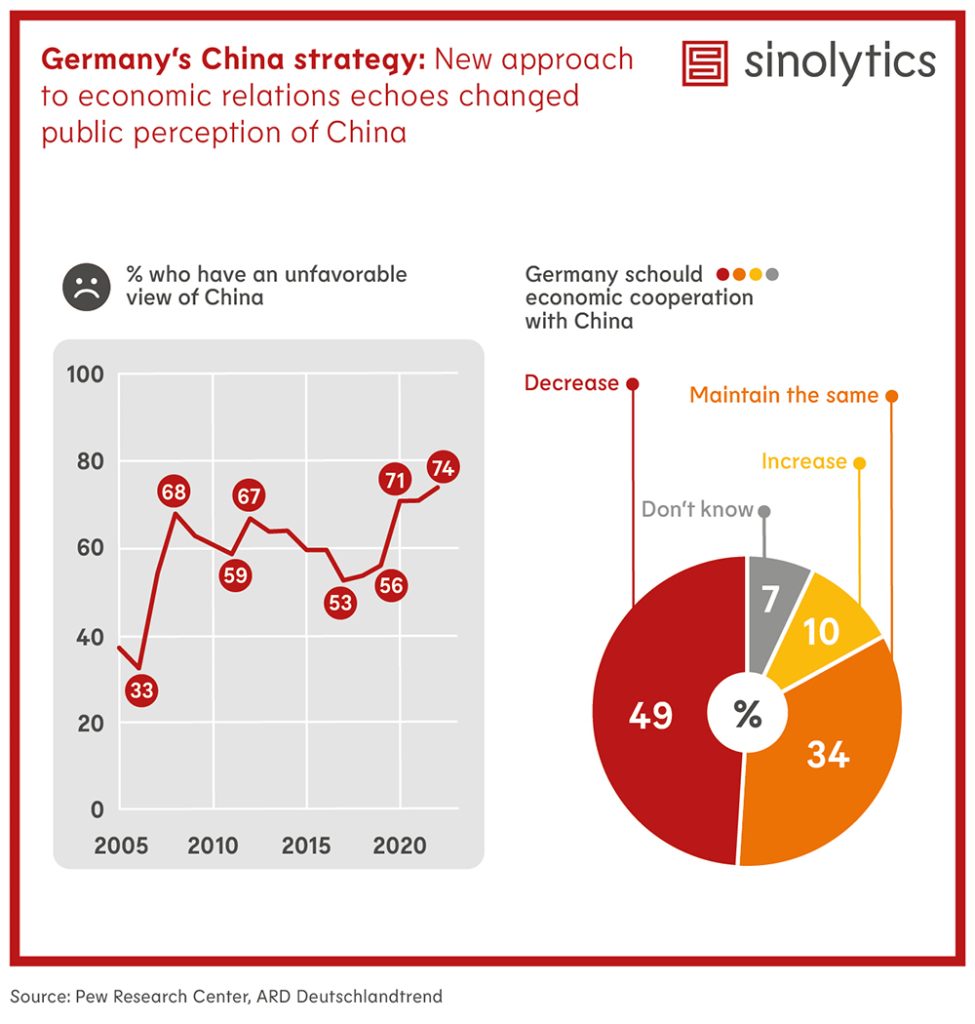
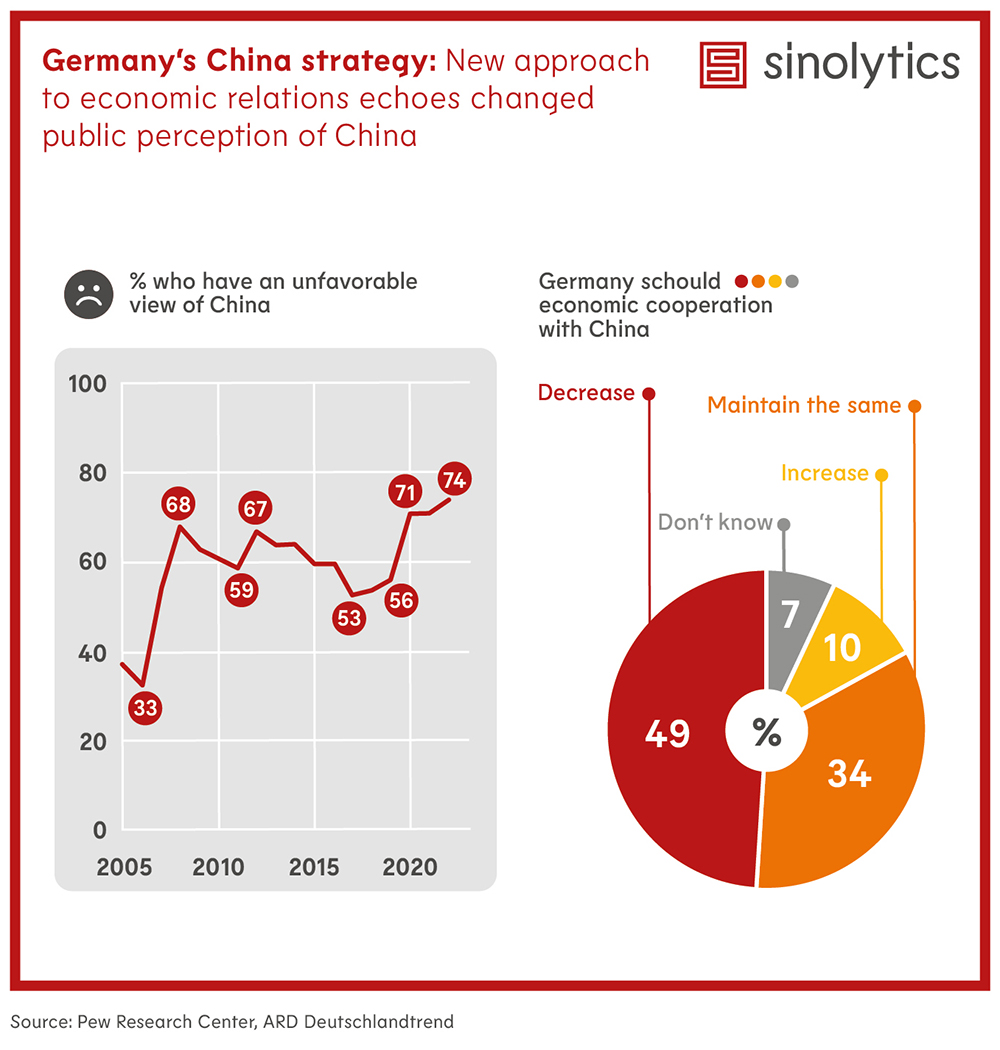
Sinolytics is a European research-based consultancy entirely focused on China. It advises European companies on their strategic orientation and concrete business activities in the People’s Republic.
TSMC is investing 2.9 billion US dollars in a semiconductor assembly plant in northern Taiwan. This is reported by the broadcaster CNBC. The background is the extreme increase in demand for high-performance chips, for example, for artificial intelligence applications.
To overcome bottlenecks, TSMC plans to double its capacities for so-called advanced packaging, as TSMC CEO C.C. Wei announced last week. This process involves connecting several chips to a carrier material in order to increase the performance of computers.
TSMC keeps the production of such high-end chips largely in its home country of Taiwan. The global market leader is also investing in the German city of Dresden and the US state of Arizona. In Dresden, however, the company aims to produce old-generation chips that are currently not good enough for the automotive industry, for example.
At the US government’s request, production in Arizona includes modern 5 nm chips. However, the project faces delays due to a shortage of skilled workers. fin
Apart from the foreign minister, the head of the Chinese central bank has also been replaced. Pan Gongsheng, previously Deputy Governor, has been appointed as the country’s top monetary watchdog, replacing Yi Gang, who had led China’s central bank since 2018.
Pan Gongsheng brings a reputation as a technocrat for emergencies, signaling the Chinese leadership’s growing concern about systemic risks in its 57 trillion US dollar financial sector. Since 2012, Pan has been Deputy Governor of the central bank and played a crucial role in the restructuring and IPOs of the state-owned Industrial and Commercial Bank of China and the Agricultural Bank of China. Since 2016, he has also headed the foreign exchange regulator, which manages the world’s largest foreign exchange reserves of around 3.2 trillion US dollars. Pan advocates a tough stance against currency speculators and supports banning cryptocurrencies.
Pan faces no easy task: He must stop the depreciation of the yuan and the crisis in the real estate market. The Chinese central bank also faces the task of helping to stabilize the economy. Between April and June, the gross domestic product grew by only 0.8 percent compared to the previous quarter. This clearly missed the first quarter’s result of 2.2 percent. In addition, youth unemployment is at a record high. rtr
US basketball player Kyle Anderson will become a Chinese citizen for the World Basketball Championships and compete in the People’s Republic team. Anderson plays for the Minnesota Timberwolves and has now naturalized ahead of the World Cup. “(Anderson) obtained Chinese nationality this morning and met Yao Ming, chairman of the Chinese Basketball Association,” a statement from the association on its official Weibo account said. Anderson is thus another athlete who has taken Chinese citizenship, though he is the first basketball player to do so.
The basketball world federation FIBA allows each country to have one naturalized player on the roster per tournament. Anderson will thus be able to participate in the Basketball World Cup in August in the Philippines, Japan and Indonesia, as well as in the 2024 Olympic Games in Paris. According to Chinese media, Anderson’s maternal grandmother was born in Jamaica and had a Chinese father.
It is unclear whether the basketball player gave up his US citizenship for the Chinese passport. China has strict rules that explicitly prohibit dual citizenship. A similar debate had erupted around skier Eileen Gu, primarily during the Winter Olympics. Gu grew up in the USA but competed for China. It was never publicly clarified whether she holds both citizenships. ari
Typhoon Doksuri, the strongest storm of the season so far, is expected to reach mainland southern China on Friday. Doksuri, classified by experts as a Category 4 typhoon on a scale of 1 to 5, is expected to make landfall between Fujian and Guangdong provinces, according to China’s National Meteorological Center.
Doksuri currently has top wind speeds of 223 Kilometers per hour and a diameter of almost 1,000 Kilometers. By the middle of the week, it will already be passing the Philippines and Taiwan. Taiwan canceled some parts of its annual military exercises for safety precautions. In the Philippines, storm warnings were partly raised, and some coastal communities evacuated.
In Fujian province, all coastal fishing boats were ordered to move to the nearest port by noon on Wednesday. Farmers were told to harvest their rice and other ripe crops. Hong Kong suspends some high-speed trains to mainland China from Wednesday to Friday.
Doksuri is expected to lose some strength but will still bring heavy rain and intense storms. In May, China narrowly escaped Typhoon Mawar, which was heading for the mainland but then diverted toward Japan before dissipating. rtr
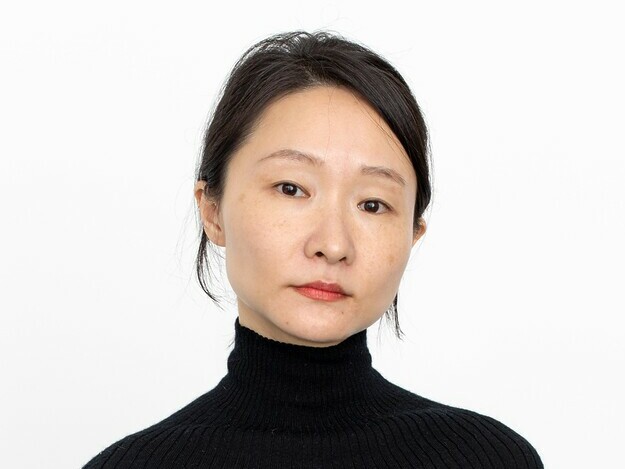
Dora Cheng has a CV with big names. She studied dramatic writing at Shanghai Theatre Academy and earned her master’s degree in visual language of performance in England at Wimbledon College of Art. Her first play, “Erupted,” was picked as the first production for the Shanghai Playhouse’s New Writing program. But when asked what stages in her CV were particularly important to her, she talked about her work as a waitress and museum guide when she first lived in Germany in 2012. Back then, she learned the language from scratch and took a break from her artistic life. “With the distance, a whole new relationship developed between me, the theater and the language.”
She has lived in Berlin since 2016 and also works in Beijing and Shanghai. She does not feel a sense of belonging to any country, neither to her Chinese homeland nor to her chosen home. “I live in Germany because my lover wants to live here,” she says, unfazed.
In her school days, Cheng already loved literature and the performing arts, dancing ballet and writing plays for her school’s drama club. Theater, she says, is more real than daily life. “On stage, I take on a different role, distance myself from my ego, and dare to reveal things that would otherwise remain hidden.”
She considers it one of the most important features of her works to show the characters’ spiritual, deeper experiential world, away from the obvious, the everyday things on display. In her first play in German, Epiphanie 顿悟, the main character is a theater worker from China who caters to the stereotype of the hardworking, silent and introverted East Asian woman. However, during the plot, her inner monologue is also shown, her very subjective emotions and experiences that have little in common with what her exterior shows.
A recurring theme in her works is the exploration of her queer and female self-awareness. They are about sexuality, family, education and career, always from a female and post-migrant perspective, often with a critical eye on the male-dominated society and the desire for a new social system. “I write and live in the tension between my migrant identity, the narrow space given to theater artists of color in Germany, and my exploration of femininity and queer identity.”
Cheng currently works as a mentor at the Shenzhen Theater Festival in southern China and is writing a new play in parallel. It will be called “Thin, White and Standard” and performed in German. Regarding the content, she has set her sights on big themes: The plot is based on the A-4 revolution in China, which erupted last year in protest against zero-Covid, and the dissident protests in Iran that have been ongoing since last September and have spread across the country under the call “Jin, Jiyan, Azadî” (Woman, Life, Freedom). Svenja Napp
Robin Loeschel is the new manager of Crown Equipment’s truck projects in Suzhou. Loeschel most recently earned his MBA at Fudan University in Shanghai. Previously, he worked for Bosch in Germany as a project manager for automotive electrification.
Khalil Hashmi is to become Pakistan’s new ambassador to China. He previously served as ambassador in Geneva and is now to succeed Moeen-ul-Haq in Beijing.
Is something changing in your organization? Let us know at heads@table.media!
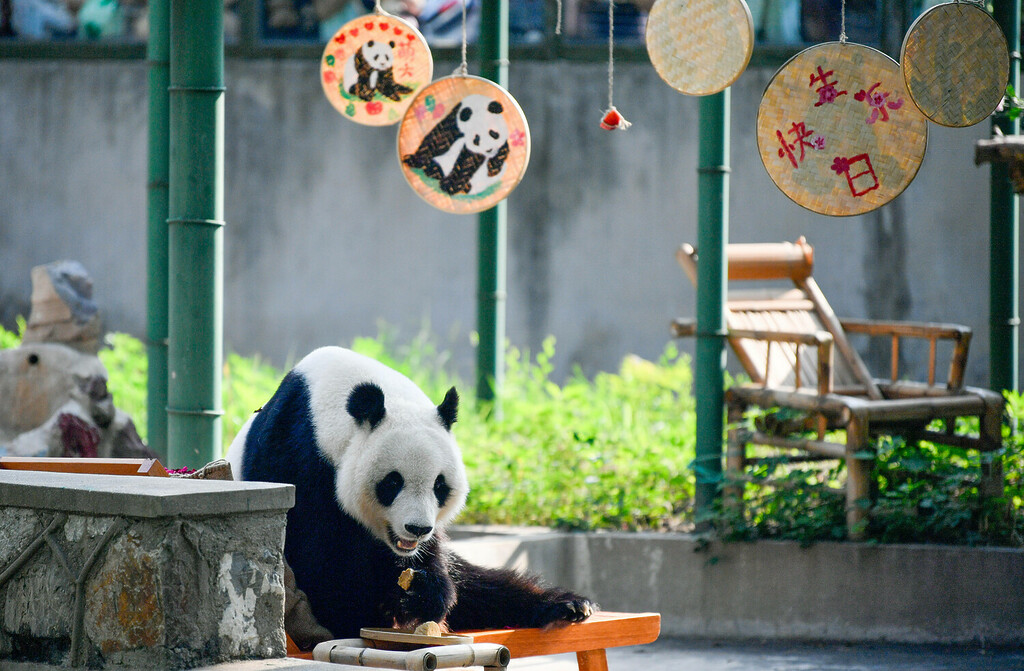
Normally we try not to feature too much cute animal-related content here in the Dessert section – but to mark Xi Le’s special day, we’ll make an exception. The giant panda is celebrating his 10th birthday at the Tianjin Zoo. There were party decorations and a cake made of fruit to celebrate.
China’s Foreign Minister Qin Gang disappears – and the government does not say a word about it for an entire month. High-ranking meetings are canceled or postponed, predecessor Wang Yi keeps stepping in. Rumors keep spreading. Finally, there are new developments in the Qin case: Xi Jinping has officially removed his former confidant from office. His predecessor Wang Yi takes over. But Qin’s whereabouts remain unclear.
The leadership may now consider the matter settled. But this incident severely tarnishes China’s international reputation, and it also has repercussions within the country. In his analysis, Finn Mayer-Kuckuk investigates why Xi wanted to dismiss the minister so quickly. There must have been serious reasons. Qin had almost certainly crossed a red line.
Domestic journalists are also supposed to work within the given lines. To do this effectively, there is a new app and platform for media professionals. It is designed to help journalists sharpen their “Marxist view of journalism,” as the All-China Journalists Association explains. What is really behind the “Journalist’s Home ‘University Hall’” (“记者之家 “大学堂) is pretty clear: It is about controlling journalists. The educational units are compulsory, and successful participation in the courses is a prerequisite for renewing the press pass, for instance, as Amelie Richter writes.


Head of state Xi Jinping has removed incumbent foreign minister Qin Gang from office. The leadership released a short announcement on the website of the state broadcaster CCTV. Former Foreign Minister Wang Yi will take over again. Qin has been absent since 25 June and is apparently in the custody of party organs, possibly the Disciplinary Commission.
The ousting of a foreign minister while the government is in office is also uncommon in China. It was more common in the chaos of the Cultural Revolution when, for example, Marshal Chen Yi was ousted in 1972 after almost 14 years in office. Chen’s successor Ji Pengfei was in office for a similarly short time until 1974, like Qin Gang. Since then, foreign ministers have been able to end their terms in office generally smoothly.
In China, ministers are appointed by the parliament, the National People’s Congress. It thus also required a decision by the Standing Committee of the People’s Congress to remove Qin from office. However, his actual removal then came in the form of a decree by President Xi Jinping.
Xi’s personal signature is also the main clue to the reason for the abrupt change in the foreign office. Apparently, the matter involves Xi directly. It is very probable that the state and party leader is the driving force behind Qin’s removal.
In any case, there had to be extreme processes within the top leadership behind this. It usually prefers to present itself as perfect and untouchable and displays a façade that is as smooth as possible. But in this case, the urgency of the removal seems to have been far more important than saving face. The disappearance of a foreign minister – China’s face to the outside world! – attracts unrelenting attention around the world.

Qin is particularly well-known to international journalists. He was an envoy at the embassy in London. He briefly answered journalists’ questions in briefings as a spokesperson for the Foreign Ministry. And Qin was ambassador to the United States. Hardly anyone enjoyed greater international prominence. He fiercely defended the People’s Republic and its system in all his posts.
The high-profile appointment brings the distinguished foreign policy expert Wang back to state office. Wang Yi now serves in both top diplomatic posts:
Wang is considered a loyal ally of Xi Jinping within the party. He had also recently taken over Qin’s appointments. However, Qin has also repeatedly been said to be very close to Xi.
Germany’s Foreign Minister Annalena Baerbock had already met both officeholders in person.

Leadership disputes are the rule rather than the exception in China, too. Many current attempts to find an explanation almost certainly fall short. The Japanese newspaper Nikkei, for example, claims that there had been a rivalry between Wang and Qin. But that is not enough for removal that would trigger such shock waves inside and outside the party. Xi would have to moderate such disagreements between his followers. The system generally has no problem withstanding such disputes.
Rumors among China observers say that Qin has cultivated too close a relationship with an inner-party faction that repeatedly criticized Xi. A more severe version of the rumor, claims it has even plotted overthrowing the ruler. This would at least explain the urgency and the severity with which Qin was removed.
One theory that Qin had a relationship with the journalist Fu Xiaotian from Phoenix TV, which ultimately led to his downfall, has gained much attention lately. Even this is far from enough to explain Qin’s fall. Many of the top cadres, almost all of them male, also have girlfriends or mistresses besides their spouses. CCP bigwigs use their privileges to get away with it without sanctions. Even in the case of sexual assault, the female victim tends to disappear rather than the influential perpetrator.
This is why the theory of Qin’s downfall over an affair also includes a variant in which Qin supposedly passed on military secrets to Fu. Depending on the version, Fu is also a double agent in this. As things stand, this story falls into the realm of bogus social media stories.
In the absence of clear communication from the CCP, such rumors spread unhindered. And they do so both in the country and internationally. The party is not doing itself any favors. It damages its international reputation. The mistress story, for example, makes the leadership appear unprofessional. Baerbock’s respected contact person from April, whom she took very seriously as a representative of China, is already a thing of the past.
But the obscure processes are also detrimental domestically. They only reinforce the impression of a detached leadership rife with intrigue. If the people cannot discern how decisions are made, it undermines the already implausible claim that China is somehow a kind of democracy.
Beijing wants to align Chinese journalists more closely with the party line: With a newly introduced platform and accompanying app, media professionals are to be taught the “Marxist view of journalism.” The All-China Journalists Association (ACJA) presented the app “Journalist’s Home ‘University Hall’” (“记者之家 “大学堂) in late June.
Members of the media are expected to watch training videos and complete online workshops on the online training platform. Course certification including training results can be checked when renewing press passes (记者证). According to Chinese state media, the app includes more than 220 courses on the Marxist view of journalism (马克思主义新闻观).
The concept of the “Marxist View of Journalism” is a shifting set of ideas that cannot be exactly defined, explains the China Media Project (CMP). The research project, which is now based in the United States, emerged from the University of Hong Kong’s Journalism and Media Studies Centre and specializes in media and reporting in mainland China and Hong Kong.
In general, the Marxist View of Journalism is the dominance of the Chinese Communist Party in the news media and the control of information, writes CMP. Journalism in the People’s Republic thus wants to clearly distinguish itself from Western ideas of journalism. This includes the notion that the press sees itself as a fourth power in the state. The concept of Marxist journalism is at the core of media training in China, explains CMP.
The platform “will play a positive role in educating and guiding journalists to concentrate their souls around Xi Jinping Thought on Socialism with Chinese Characteristics for a New Era”, said a press release from the ACJA and Xinhua news agency. Millions of journalists nationwide would now be able to take the training courses.
When the app was introduced at the end of June, ACJA head He Ping said it was crucial to “strengthen the backbone” of journalists in China and “arm” their minds with Xi Jinping’s governing concepts.
The true purpose of the training app and platform is “frighteningly simple”, CMP’s David Bandurski told Table.Media: “For many years, the Chinese party leadership has emphasized the need to control the media and information. A crucial part of this process is licensing journalists and ensuring that they discipline themselves and act in a way that benefits the party state.”
China’s media professionals have to go through an annual evaluation process to obtain a new press pass, Bandurski said. This includes education in the “Marxist view of journalism”. He said the purpose of the app is to simplify this process for the authorities and ensure that the idea can remain ever-present for journalists. “It is simply about control,” says Bandurski.
But the day-to-day work of foreign media professionals in China could also become even more difficult – because a recent amendment to the Counter-espionage Law came into effect in early July. The amendments, passed in April, broaden the definition of espionage and prohibit the disclosure of any information deemed related to national security. This could also prove problematic for foreign correspondents in China.
Press freedom analysts believe the changes will make it more difficult to obtain information. “Quite a few of us are worried about what it is and what it might mean,” US foreign broadcaster VOA quoted a foreign correspondent in Beijing as saying. At present, it is difficult to foresee what the implementation will mean for everyday work, they said. “Any kind of news gathering seems like it could be construed as a violation of this law,” the journalist added.
In the revised law, the definition of espionage also includes access to “documents, data, materials, or objects related to national security and interests.” According to Cedric Alviani, head of the East Asia office of Reporters Without Borders, “basically this means any kind of information.” The law has been kept deliberately vague, he added.
The Chinese embassy in Washington said it referred VOA to a statement by Chinese Foreign Ministry spokeswoman Mao Ning. She stressed that “there is no need to associate the counterespionage law with reporting activities of foreign journalists.” China welcomes journalists from all countries working in the People’s Republic in accordance with laws and regulations, Mao Ning said.


Sinolytics is a European research-based consultancy entirely focused on China. It advises European companies on their strategic orientation and concrete business activities in the People’s Republic.
TSMC is investing 2.9 billion US dollars in a semiconductor assembly plant in northern Taiwan. This is reported by the broadcaster CNBC. The background is the extreme increase in demand for high-performance chips, for example, for artificial intelligence applications.
To overcome bottlenecks, TSMC plans to double its capacities for so-called advanced packaging, as TSMC CEO C.C. Wei announced last week. This process involves connecting several chips to a carrier material in order to increase the performance of computers.
TSMC keeps the production of such high-end chips largely in its home country of Taiwan. The global market leader is also investing in the German city of Dresden and the US state of Arizona. In Dresden, however, the company aims to produce old-generation chips that are currently not good enough for the automotive industry, for example.
At the US government’s request, production in Arizona includes modern 5 nm chips. However, the project faces delays due to a shortage of skilled workers. fin
Apart from the foreign minister, the head of the Chinese central bank has also been replaced. Pan Gongsheng, previously Deputy Governor, has been appointed as the country’s top monetary watchdog, replacing Yi Gang, who had led China’s central bank since 2018.
Pan Gongsheng brings a reputation as a technocrat for emergencies, signaling the Chinese leadership’s growing concern about systemic risks in its 57 trillion US dollar financial sector. Since 2012, Pan has been Deputy Governor of the central bank and played a crucial role in the restructuring and IPOs of the state-owned Industrial and Commercial Bank of China and the Agricultural Bank of China. Since 2016, he has also headed the foreign exchange regulator, which manages the world’s largest foreign exchange reserves of around 3.2 trillion US dollars. Pan advocates a tough stance against currency speculators and supports banning cryptocurrencies.
Pan faces no easy task: He must stop the depreciation of the yuan and the crisis in the real estate market. The Chinese central bank also faces the task of helping to stabilize the economy. Between April and June, the gross domestic product grew by only 0.8 percent compared to the previous quarter. This clearly missed the first quarter’s result of 2.2 percent. In addition, youth unemployment is at a record high. rtr
US basketball player Kyle Anderson will become a Chinese citizen for the World Basketball Championships and compete in the People’s Republic team. Anderson plays for the Minnesota Timberwolves and has now naturalized ahead of the World Cup. “(Anderson) obtained Chinese nationality this morning and met Yao Ming, chairman of the Chinese Basketball Association,” a statement from the association on its official Weibo account said. Anderson is thus another athlete who has taken Chinese citizenship, though he is the first basketball player to do so.
The basketball world federation FIBA allows each country to have one naturalized player on the roster per tournament. Anderson will thus be able to participate in the Basketball World Cup in August in the Philippines, Japan and Indonesia, as well as in the 2024 Olympic Games in Paris. According to Chinese media, Anderson’s maternal grandmother was born in Jamaica and had a Chinese father.
It is unclear whether the basketball player gave up his US citizenship for the Chinese passport. China has strict rules that explicitly prohibit dual citizenship. A similar debate had erupted around skier Eileen Gu, primarily during the Winter Olympics. Gu grew up in the USA but competed for China. It was never publicly clarified whether she holds both citizenships. ari
Typhoon Doksuri, the strongest storm of the season so far, is expected to reach mainland southern China on Friday. Doksuri, classified by experts as a Category 4 typhoon on a scale of 1 to 5, is expected to make landfall between Fujian and Guangdong provinces, according to China’s National Meteorological Center.
Doksuri currently has top wind speeds of 223 Kilometers per hour and a diameter of almost 1,000 Kilometers. By the middle of the week, it will already be passing the Philippines and Taiwan. Taiwan canceled some parts of its annual military exercises for safety precautions. In the Philippines, storm warnings were partly raised, and some coastal communities evacuated.
In Fujian province, all coastal fishing boats were ordered to move to the nearest port by noon on Wednesday. Farmers were told to harvest their rice and other ripe crops. Hong Kong suspends some high-speed trains to mainland China from Wednesday to Friday.
Doksuri is expected to lose some strength but will still bring heavy rain and intense storms. In May, China narrowly escaped Typhoon Mawar, which was heading for the mainland but then diverted toward Japan before dissipating. rtr

Dora Cheng has a CV with big names. She studied dramatic writing at Shanghai Theatre Academy and earned her master’s degree in visual language of performance in England at Wimbledon College of Art. Her first play, “Erupted,” was picked as the first production for the Shanghai Playhouse’s New Writing program. But when asked what stages in her CV were particularly important to her, she talked about her work as a waitress and museum guide when she first lived in Germany in 2012. Back then, she learned the language from scratch and took a break from her artistic life. “With the distance, a whole new relationship developed between me, the theater and the language.”
She has lived in Berlin since 2016 and also works in Beijing and Shanghai. She does not feel a sense of belonging to any country, neither to her Chinese homeland nor to her chosen home. “I live in Germany because my lover wants to live here,” she says, unfazed.
In her school days, Cheng already loved literature and the performing arts, dancing ballet and writing plays for her school’s drama club. Theater, she says, is more real than daily life. “On stage, I take on a different role, distance myself from my ego, and dare to reveal things that would otherwise remain hidden.”
She considers it one of the most important features of her works to show the characters’ spiritual, deeper experiential world, away from the obvious, the everyday things on display. In her first play in German, Epiphanie 顿悟, the main character is a theater worker from China who caters to the stereotype of the hardworking, silent and introverted East Asian woman. However, during the plot, her inner monologue is also shown, her very subjective emotions and experiences that have little in common with what her exterior shows.
A recurring theme in her works is the exploration of her queer and female self-awareness. They are about sexuality, family, education and career, always from a female and post-migrant perspective, often with a critical eye on the male-dominated society and the desire for a new social system. “I write and live in the tension between my migrant identity, the narrow space given to theater artists of color in Germany, and my exploration of femininity and queer identity.”
Cheng currently works as a mentor at the Shenzhen Theater Festival in southern China and is writing a new play in parallel. It will be called “Thin, White and Standard” and performed in German. Regarding the content, she has set her sights on big themes: The plot is based on the A-4 revolution in China, which erupted last year in protest against zero-Covid, and the dissident protests in Iran that have been ongoing since last September and have spread across the country under the call “Jin, Jiyan, Azadî” (Woman, Life, Freedom). Svenja Napp
Robin Loeschel is the new manager of Crown Equipment’s truck projects in Suzhou. Loeschel most recently earned his MBA at Fudan University in Shanghai. Previously, he worked for Bosch in Germany as a project manager for automotive electrification.
Khalil Hashmi is to become Pakistan’s new ambassador to China. He previously served as ambassador in Geneva and is now to succeed Moeen-ul-Haq in Beijing.
Is something changing in your organization? Let us know at heads@table.media!

Normally we try not to feature too much cute animal-related content here in the Dessert section – but to mark Xi Le’s special day, we’ll make an exception. The giant panda is celebrating his 10th birthday at the Tianjin Zoo. There were party decorations and a cake made of fruit to celebrate.
